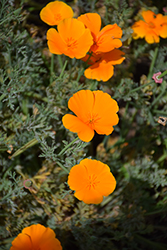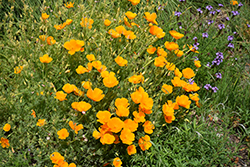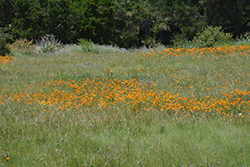Plant Height: 12 inches
Flower Height: 24 inches
Spread: 14 inches
Sunlight:
![]()
Hardiness Zone: 8b
Description:
California's state flower, the gray green foliage forms a ferny rosette topped by flower stalks producing dazzling golden blooms that emerge for several weeks; cut down plants for reblooming flush; often grown as an annual in colder climates
Ornamental Features
California Poppy has masses of beautiful gold cup-shaped flowers with yellow edges at the ends of the stems from late spring to late summer, which are most effective when planted in groupings. Its attractive ferny leaves remain grayish green in colour throughout the season.
Landscape Attributes
California Poppy is an herbaceous perennial with an upright spreading habit of growth. Its relatively fine texture sets it apart from other garden plants with less refined foliage.
This plant will require occasional maintenance and upkeep, and is best cleaned up in early spring before it resumes active growth for the season. It is a good choice for attracting bees and butterflies to your yard, but is not particularly attractive to deer who tend to leave it alone in favor of tastier treats. Gardeners should be aware of the following characteristic(s) that may warrant special consideration;
- Self-Seeding
California Poppy is recommended for the following landscape applications;
- Mass Planting
- Rock/Alpine Gardens
- General Garden Use
- Naturalizing And Woodland Gardens
- Container Planting
Planting & Growing
California Poppy will grow to be about 12 inches tall at maturity extending to 24 inches tall with the flowers, with a spread of 14 inches. It grows at a fast rate, and under ideal conditions can be expected to live for approximately 5 years. As an herbaceous perennial, this plant will usually die back to the crown each winter, and will regrow from the base each spring. Be careful not to disturb the crown in late winter when it may not be readily seen!
This plant should only be grown in full sunlight. It is very adaptable to both dry and moist growing conditions, but will not tolerate any standing water. It is considered to be drought-tolerant, and thus makes an ideal choice for a low-water garden or xeriscape application. This plant does not require much in the way of fertilizing once established. It is not particular as to soil pH, but grows best in poor soils. It is somewhat tolerant of urban pollution. This species is native to parts of North America.
California Poppy is a fine choice for the garden, but it is also a good selection for planting in outdoor pots and containers. With its upright habit of growth, it is best suited for use as a 'thriller' in the 'spiller-thriller-filler' container combination; plant it near the center of the pot, surrounded by smaller plants and those that spill over the edges. Note that when growing plants in outdoor containers and baskets, they may require more frequent waterings than they would in the yard or garden.
Disclaimer - This resource is provided for informational purposes only and does NOT reflect current availability. Inventory varies seasonally, so we cannot guarantee that every plant will be in stock at all times - please contact your favourite GardenWorks location directly for current availability. It does not include our entire inventory of plants, so be sure to visit GardenWorks to see varieties that may not be represented on this list.



